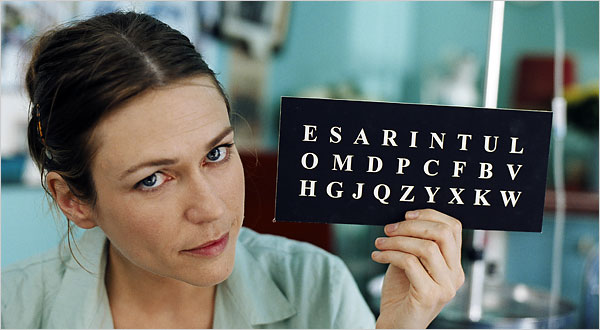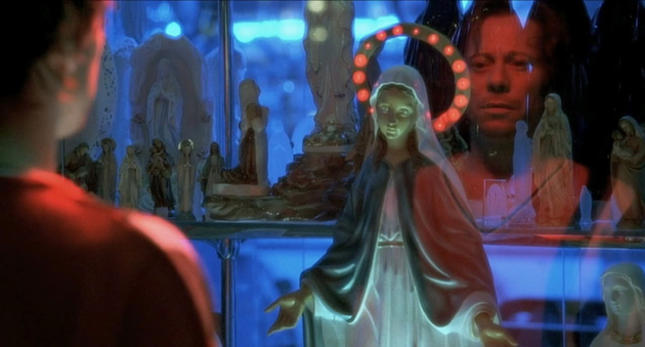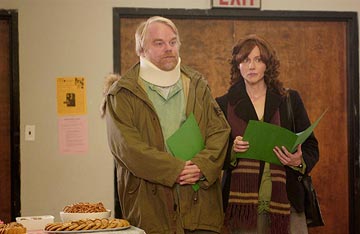
“
Euh ess ahh err eee enn teh veh, ell, oh…” Suffice to say, I’m
so glad I’m not writing this entry letter-by-letter (and in French to boot.) The
first half of a powerful Saturday afternoon double-feature at the Angelika,
Julian Schnabel’s The Diving Bell and the Butterfly, from the
painstakingly-crafted memoir by Jean-Dominique Bauby, is an impressive and heartfelt depiction of how one man’s personal Hell becomes, through love, will, memory, and imagination, at least a barely endurable purgatory. At first glance, a film about being almost completely immobilized in a hospital bed for months and years on end may not seem like your cup of tea — I wasn’t sure it would be mine. But, despite the inherent sadness to Bauby’s story,
Diving Bell is in fact overflowing with humor and even
joie de vivre in the face of horrific tragedy. Yes, it says, you don’t know what you’ve got until it’s gone. But, even if you’ve lost everything, including basic motor function…well, all you have to do is dream.
The Diving Bell and the Butterfly begins in a blur. Blue-gray blobs fade in and out of vision, ultimately rectifying into institutional decor and men in white coats. We’re in a hospital room, but we, and our narrator Jean-Do Bauby (Mathieu Amalric, of Munich) don’t know why or how we got there. Worse, while we hear our narrator perfectly fine, nobody else can. It seems Bauby can no longer speak. Nor can he do anything else for that matter, except look around the room in abject horror and blink. Eventually, one of the doctors explains that Bauby has had a stroke, is emerging from a coma after several weeks, and now suffers from a rare medical condition known as “locked-in syndrome,” for which there may not be any cure. If this sounds like a fate worse than death, well, it seems so to Bauby at first too. But, when trapped in yourself, body your holding cell, it definitely helps to have a bevy of French beauties around to look after you, including the estranged mother of Bauby’s children (Emanuelle Seigner) and two therapists at the hospital (One, Olatz Lopez Garmendia, is Schnabel’s real-life wife. The other, Marie Josee-Croze (also of Munich), is the spitting image of Naomi Watts and, needless to say, also very easy on the one working eye.)
With the latter’s help, Bauby eventually grows used to a lengthy but workable system of communication whereby he blinks when the letter he wants to employ is named from a list (from most-used to least-used), thus piecing together words, sentences, and paragraphs after long hours of toil. As he becomes accustomed to his condition and this new system, Bauby, formerly an editor at Elle magazine, dwells on his recent past — say, shaving his elderly father (Max Von Sydow) the week before the incident, or taking a trip to Lourdes with his most recent love (Marina Hands), who is now afraid to visit him. In addition, he starts taking imaginative flights of fancy from his bodily prison (Enter Emma de Caunes of The Science of Sleep), and ultimately decides he’s going to write a book about the entire experience, blink by painstaking blink (thus bringing another beautiful woman into the equation, his new assistant (Anne Consigny). I mean, I know being a completely paralyzed invalid in any hospital is a horrible, horrible experience…but really, aren’t there any unattractive orderlies or assistants in France?)
If you’ve taken an art or film theory class in the past thirty years, somewhere amid viewings of Metropolis, 8 1/2, and/or Blade Runner you more than likely came across the concept of the “male gaze.” Diving Bell‘s clever conceit is to make that concept literal: For much of the film, the camera is Bauby’s POV. We are trapped in Jean-Do’s body for at least the first thirty minutes of the movie and experience everything from his perspective, from the grisly horror of having one’s eye sewn shut to the tantalizing triangle of exposed neck revealed by his lovely therapists. (At one point, around twenty minutes in, I turned to look at the audience, and everybody in the theater (also) had their head cocked uncomfortably to the left.) It is testament to Schnabel’s skill here that this effect, while assuredly feeling claustrophobic, never becomes oppressive to the point of being unwatchable. (There are some great, humorous touches to leaven things, such as when Jean-Do’s new winter cap ends up obscuring some of his/our view.) And, when the camera later forsakes the diving bell world of flesh and frailty for the butterfly realm of memory and imagination, we feel the same exhilarating sense of liberation Bauby describes in voiceover. By finally soaring out of the confines of Bauby’s body and roaming the world with abandon, Diving Bell offers a visceral reminder of the power of film, and of imagination.
There are moments I might quibble with in Diving Bell — The recap of his accident comes rather late in the movie, and feels slightly unnecessary there (I assume this is where it might have fallen in the book — I haven’t read it, although I more than likely will now.) And the film is undeniably slow at times. (But that’s by design, of course. Given the sheer amount of effort Bauby must expend to compose a single word, a faster-moving film would have been untrue and unfair to the proceedings.) Nevertheless, particularly for a film about something as nightmarish as locked-in syndrome, The Diving Bell and the Butterfly is truly transporting. It reminds us that there’s a certain miraculous magic to the power of sight, and that experiencing even the daily mundanities of the world is something we shouldn’t ever take for granted.






